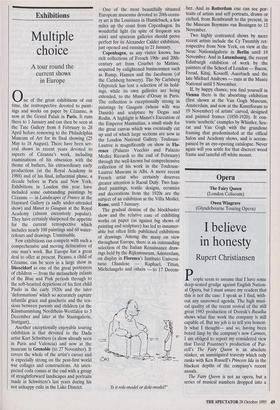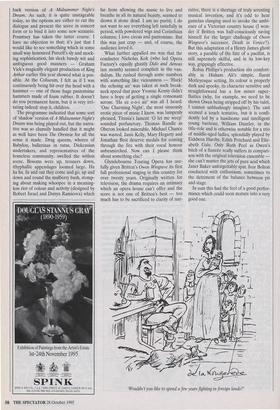Opera
The Fairy Queen (London Coliseum) Owen Wingrave (Glyndebourne Touring Opera)
I believe in honesty
Rupert Christiansen
People seem to assume that I have some deep-seated grudge against English Nation- al Opera, but I must assure my readers that this is not the case: I speak as I find, with- out any unavowed agenda. The high musi- cal quality of the recent revival of the still great 1983 production of Dvorak's Rusalka shows what fine work the company is still capable of. But my job is to tell you honest- ly what I thought— and so, having been bored limp by the company's new Carmen, I am obliged to report my considered view that David Pountney's production of Pur- cell's The Fairy Queen is an absolute stinker, an unmitigated travesty which only ranks with Ken Russell's Princess Ida in the blackest depths of the company's recent annals.
The Fairy Queen is not an opera, but a series of musical numbers dropped into a hack version of A Midsummer Night's Dream. As such, it is quite unstageable today, so the options are either to cut the dialogue and present the score in concert form or to bind it into some new scenario. Pountney has taken the latter course. I have no objection to that; it's just that I would like to see something which in some small way honoured Purcell's sly and mock- ing sophistication, his sleek bawdy wit and ambiguous good manners — Graham Vick's magically elegant production of King Arthur earlier this year showed what is pos- sible. At the Coliseum, I felt as if I was continuously being hit over the head with a hammer — one of those huge pantomime hammers made of foam rubber. It doesn't do you permanent harm, but it is very irri- tating indeed: stop it, children.
The programme indicated that some sort of 'shadow' version of A Midsummer Night's Dream was being played out, but the narra- tive was so clumsily handled that it might as well have been The Oresteia for all the sense it made. Drag queens, whores of Babylon, ballerinas in tutus, Dickensian undertakers, and representatives of the homeless community, swelled the witless scene. Bosoms were up, trousers down, ithyphallic appendages loomed large. Ha ha ha. In and out they come and go, up and down and round the mulberry bush, stomp- ing about making whoopee in a meaning- less riot of colour and activity (designed by Robert Israel and Dunya Ramicova) which far from allowing the music to live and breathe in all its natural beauty, seemed to drown it stone dead. I am no purist; I do not want to see everything left tastefully in period, with powdered wigs and Corinthian columns; I love circus and pantomime. But this was just crap — and, of course, the audience loved it.
What further appalled me was that the conductor Nicholas Kok (who led Opera Factory's equally ghastly Dido and Aeneas last month) seemed complicit in the van- dalism. He rushed through some numbers with something like viciousness — 'Hark! the echoing air' was taken at such break- neck speed that poor Yvonne Kenny didn't have a hope of getting a single consonant across: 'Ha ee e-o-i air' was all I heard. `One Charming Night', the most sinuously erotic piece of music I know, was lumpenly phrased, Titania's lament '0 let me weep' sounded perfunctory. Thomas Randle as Oberon looked miserable, Michael Chance was wasted, Janis Kelly, Mary Hegarty and Jonathan Best deserve medals for coming , through the fire with their vocal honour unbesmirched. Now can I please think about something else?
Glyndebourne Touring Opera has use- fully given Britten's Owen Wingrave its first full professional staging in this country for over twenty years. Originally written for television, the drama requires an intimacy which an opera house can't offer and the score is not one of Britten's best — too much has to be sacrificed to clarity of nar- rative, there is a shortage of truly arresting musical invention, and it's odd to hear gamelan clanging used to invoke the ambi- ence of a Victorian country house (I won- der if Britten was half-consciously saving himself for the larger challenge of Owen Wingmve's successor, Death in Venice?). But this adaptation of a Henry James ghost story, a parable of the fate of a pacifist, is still supremely skilful, and in its low-key way, grippingly effective.
Robin Phillips's production sits comfort- ably in Hisham Ali's simple, fluent Motleyesque setting. Its colour is properly dark and spooky, its character sensitive and straightforward bar a few minor super- fluities (why, for example, we need to be shown Owen being stripped off by his valet, I cannot unblushingly imagine). The cast seemed a touch tentative, but it is confi- dently led by a handsome and intelligent young baritone, William Dazeley, in the title-role and is otherwise notable for a trio of middle-aged ladies, splendidly played by Eiddwen Harrhy, Edith Pritchard and Eliz- abeth Gale. Only Ruth Peel as Owen's bitch of a fiancée really suffers in compari- son with the original television ensemble she can't muster the jets of pure acid which Janet Baker unforgettably spat. Ivor Bolton conducted with enthusiasm, sometimes to the detriment of the balance between pit and stage.
In sum this had the feel of a good perfor- mance which could soon mature into a very good one.
`Wouldn't you like to spend a few years fighting in foreign lands?'



































































 Previous page
Previous page